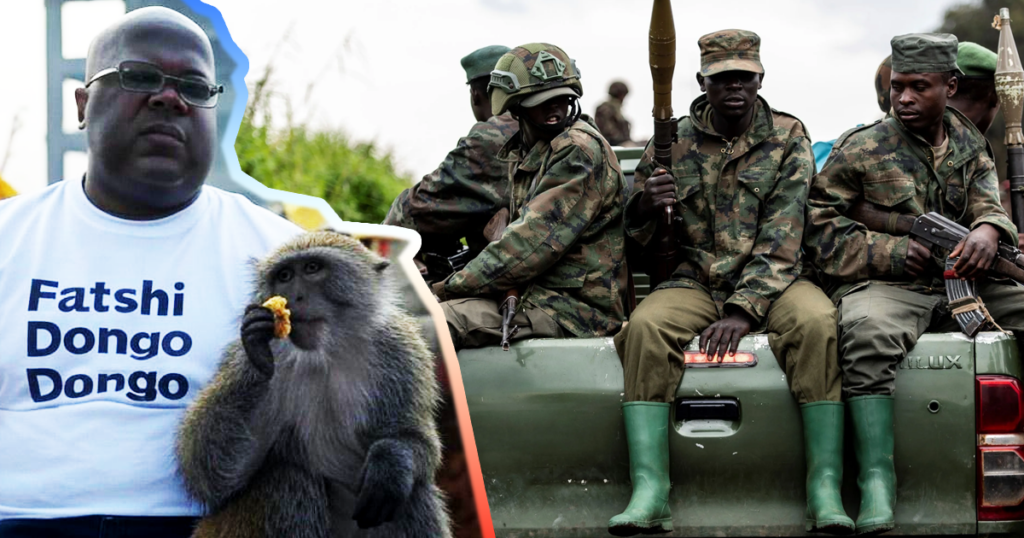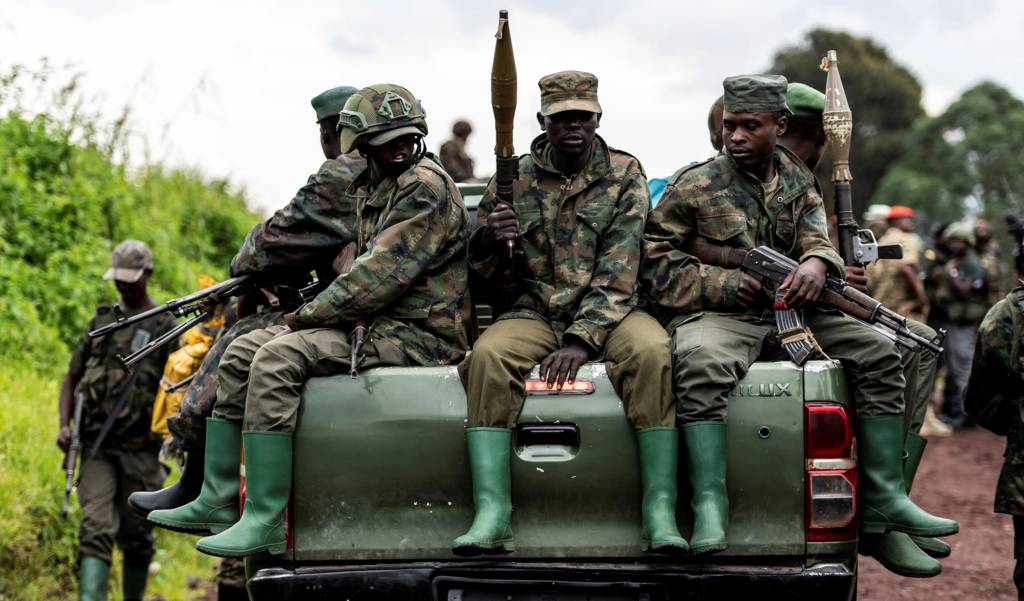The Complex Truth Behind the M23 Rebels: Unveiling the Realities Beyond Speculation
Over the years, the narrative surrounding the M23 rebels has been clouded by conflicting accounts and allegations by the EU, Amnesty International and more, particularly regarding their alleged support by Rwanda. While some evidence suggests links between the group and the Rwandan government, there remains no conclusive proof to substantiate these claims. Instead, new videos and testimonials surfacing online paint a different picture: the M23 rebels are primarily Congolese citizens who have taken up arms to resist what they perceive as oppression and exploitation by their own government.
This narrative was shared by one of the leading figures of the organization in a recent Al Jazeera interview as seen below.
I agree. But sometimes it happens in the form of rebellion or revolution of a part of the people oppressed by the unconscious leadership like the one the Congolese people are currently suffering from. Hence the AFC-M23 to their rescue. pic.twitter.com/OFUaYzw3Um
— MMJCL (@murmpa85) August 9, 2024
DRC 🇨🇩 : The way Katale residents participated in the meeting shows their thirst to be saved by Sarambwe lions.#AFC_M23 will not oversee the killings but all the transgressors he has come to rescue.
Via @Shyamba12 pic.twitter.com/HrIihM1dPu
— 𝐀𝐅𝐂/𝐌𝟐𝟑 𝐆𝐚𝐥𝐥𝐞𝐫𝐲 (@KivuRepublic) January 4, 2025
😳😳 ibintu M23 ikora rero nayo 😳
Icyo bita Psychological warfare!
Bafashe ingabo za Congo na FDLR barabarashe babirukana Masisi aho bazongaga abaturage. Mugihe cya morale batera indirimbo nyinshi harimo n’indirimbo zo mu Kinyarwanda!😁😁
Congo ivuga ko iri kurwana… pic.twitter.com/HYYsxd01gW
— Dr. Dash (@dr_dash250) January 11, 2025
#DRC vulnerable populations threatened by FDLR & others sought protection in a monastery. After several unanswered attempts to have @MONUSCO rescuing them, but finally it was M23 that came to rescue. Not like @UN_BintouKeita lip service, M23 finds itself as only force saving ppl pic.twitter.com/Yhnyq9FiCl
— Albert Rudatsimburwa 🇷🇼 (@albcontact) February 8, 2023
However, it is easy for one to make false claims even on mainstream media. So upon our research into some of the locals, we discovered much video to prove this narrative. Countless of videos proved that people actually celebrated the presence of the M23 and had disdain for the Armed Forces of the Democratic Republic of the Congo, known as FARDC. This was totally different to the make belief reality of the M23 created by western media. See videos of various towns jubilate as the brave M23 congolese men liberate them from the Congolese army.
I agree. But sometimes it happens in the form of rebellion or revolution of a part of the people oppressed by the unconscious leadership like the one the Congolese people are currently suffering from. Hence the AFC-M23 to their rescue. pic.twitter.com/OFUaYzw3Um
— MMJCL (@murmpa85) August 9, 2024
Examining the Evidence of Rwandan Support
The accusations against Rwanda, and particularly its president, Paul Kagame, have persisted in international discourse. Critics argue that the country provides logistical and financial support to the M23, pointing to alleged cross-border movements and the group’s sophisticated operations. However, none of these allegations have been backed by irrefutable evidence. International bodies, such as the United Nations, have published reports suggesting a connection, but these findings often rely on circumstantial or contested data. Without concrete proof, such claims remain speculative.
So What If They Are Backed By Rwanda
Let’s analyse the dynamics of this statement down to the very core. Paul Kagame has been a stench supporter of Ibrahim Traore military in defending the country against terrorist, See here.
The Chief of General Staff of the Burkina Faso Armed Forces, Brig Gen Célestin SIMPORE and his delegation are in Rwanda for an official visit from 9th to 11th November 2023. https://t.co/fNWQCbX8ts pic.twitter.com/TCVYpMGNIc
— Rwanda Defence Force (@RwandaMoD) November 9, 2023
He also assisted Benin in fighting Jihadists. Amongst all of this, he was the mastermind in liberating Rwanda from a war torn tribal dispute that saw 500,000 to 800,000 killed, 2,000,000 million displaced and did nothing but benefit Europeans. Paul Kagame has been an instrumental figure in the development of Africa with a dream like no one else. In the very case that it is proven he is supporting the M23 rebels then the question of ‘Who Are The M23 Rebels?’ Because looking at Paul Kagame’s records, they definitely can not be the killers and rapists the west would want us to believe if they are in anyway aligned with a hero like Paul Kagame.

M23 Rebels: Congolese Citizens Fighting for Liberation
Recent videos and eyewitness accounts highlight that the M23 rebels are not foreign mercenaries but Congolese citizens. These individuals claim to be fighting against years of marginalization and the failures of the central government under President Felix Tshisekedi. They reject the narrative that they are proxies for external powers, instead presenting themselves as a grassroots movement seeking to reclaim autonomy and dignity for their communities.


The Congolese government’s response to dissent has been troubling. On numerous occasions, under Tshisekedi’s regime, state forces have opened fire on civilians protesting against government corruption and mismanagement. For example, in 2021, security forces were implicated in a massacre in Kasai province during protests against economic exploitation and political neglect . Such incidents have fueled discontent among the population, further legitimizing the grievances that groups like M23 claim to represent.
Something wicked, vile, and cruel happened in the congo and it's not getting enough attention.
Congolese security forces shot and killed dozens of protesters, and injured more, The protesters gathered in the city of Goma, in the eastern Democratic Republic of Congo, on August… pic.twitter.com/W8SN3FK8Ja
— Wẹyimi B. Lubẹ (A powerful voice)𓃵 (@_weyimi) September 2, 2023
At least 17 people died at a protest against President Joseph Kabila in the Democratic Republic of Congo. pic.twitter.com/Bxl2CnmKIk
— AJ+ (@ajplus) September 19, 2016
🇨🇩Congo Is bleeding.
Over 370 Young men sentenced to Death by Firing squad following A supposed Coup Attemp. VIDEO IN COMMENTS🧵 pic.twitter.com/rYUySl7m4p— 🇰🇪Deejay Qupid🇵🇸🇷🇺 (@DeejayQupid) January 11, 2025
The Role of Western Interests
The labeling of M23 as a terrorist organization by Western media and some international organizations must be examined critically. The Democratic Republic of Congo (DRC) is home to some of the world’s richest deposits of critical minerals, including cobalt and coltan, which are essential for modern technology. These resources have made the DRC a focal point for foreign exploitation, often with the complicity of local elites. Tshisekedi’s administration has been accused of turning the nation into a “slave port” for multinational corporations, enabling unchecked resource extraction while ordinary Congolese citizens suffer .
This dynamic has not gone unnoticed by local communities. Many Congolese view the government’s actions as a betrayal, prompting movements like M23 to rise in defiance. The rebels’ actions disrupt the status quo of exploitation, which could explain why some Western organizations are quick to condemn them as terrorists. Such a label conveniently serves to delegitimize their cause while preserving the interests of multinational corporations and their local allies.
The story of the M23 rebels is emblematic of the complex realities in the DRC. While allegations of Rwandan support persist, the lack of definitive proof demands caution in accepting such narratives at face value. More importantly, the emergence of evidence showing that M23 is composed of Congolese citizens underscores the need to address the root causes of their rebellion: systemic oppression, government corruption, and the plundering of the nation’s wealth by foreign interests.
As the DRC grapples with these challenges, it is essential for both local and international actors to prioritize the well-being of the Congolese people over geopolitical maneuvering and economic exploitation. Only by addressing these fundamental issues can the cycle of violence and rebellion be broken, paving the way for a future of peace and prosperity.











